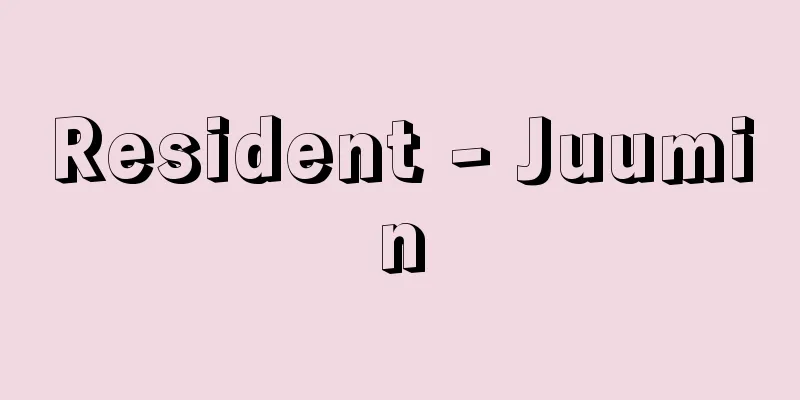Resident - Juumin

|
Legally, a municipality is a human component of a local government, and refers to a person who has an address, or a base of life, within the area of the municipality. The residents of a municipality are also considered to be residents of the prefecture that includes it (Local Autonomy Law, Article 10, Paragraph 1). They may be natural or legal persons, and they do not matter about their nationality, sex, age, or legal capacity. Residents have certain rights and obligations as residents. In general, they have the right to receive equally the services of the local government to which they belong, and the obligation to share the burden of these services (Local Autonomy Law, Article 10, Paragraph 2). Local governments are obligated to provide public assistance, social welfare, and various other services and benefits to residents, in addition to establishing various public facilities. Residents can enjoy these services equally, and local governments are obligated to provide these services fairly and equally. On the other hand, residents are obligated to bear equally (in principle, according to their ability to bear) the expenses required for the administration. However, the specific rights and obligations of residents are determined by law. Residents who are Japanese nationals and who meet certain requirements are granted the right to directly elect the head and members of local government assemblies (Article 93 of the Constitution, Article 11 of the Local Autonomy Law), the right to request the establishment, amendment, or repeal of ordinances and audits of administrative affairs (Article 12 of the Local Autonomy Law), the right to request the dissolution of assemblies and the dismissal of key public officials (Article 13 of the Local Autonomy Law), and the right to request resident audits and resident lawsuits (Articles 242 and 242-2 of the Local Autonomy Law). [Toshiro Fuka] Source: Shogakukan Encyclopedia Nipponica About Encyclopedia Nipponica Information | Legend |
|
法令上、地方公共団体の人的構成要素であり、市町村の区域内に住所、すなわち生活の本拠をもつ者をいう。市町村の住民は、同時にこれを包括する都道府県の住民とされる(地方自治法10条1項)。自然人たると法人たるとを問わず、また、国籍、性、年齢のいかん、および行為能力のいかんを問わない。住民は、住民として一定の権利と義務をもつ。一般的には、その属する地方公共団体の役務の提供を等しく受ける権利と、その負担を分任する義務である(同法10条2項)。地方公共団体は、各種の公の施設を設置するほか、公的扶助、社会福祉その他多様なサービス・給付を住民に対して行ったり、行う義務が課されている。住民はこれらの役務を平等に享受でき、地方公共団体はその役務提供を公正かつ平等に行う義務を負う。その反面、住民には、その行政に要する経費を平等に(原則として、負担能力に応じて)負担する義務がある。ただし、住民の権利・義務の具体的内容は法律の定めるところによる。なお、住民のうち、日本国民であり、同時に一定の要件を具備する者については、地方公共団体の長や議会の議員を直接選挙する権利(憲法93条、地方自治法11条)、条例の制定・改廃および事務の監査を請求する権利(地方自治法12条)、議会の解散請求権および主要公務員の解職請求権(同法13条)、および住民監査請求・住民訴訟の権利(同法242条・242条の2)などが認められている。 [福家俊朗] 出典 小学館 日本大百科全書(ニッポニカ)日本大百科全書(ニッポニカ)について 情報 | 凡例 |
<<: Residents' movement - Juminundou
Recommend
Diplomatic prerogative - gaiko taiken
The Emperor's powers under the Meiji Constitut...
Pintail duck - Pintail
A bird of the family Anatidae in the order Anseri...
Hertz, CM (English spelling) HertzCM
…Ultrasound is a method of recording the movement...
Tamatsushima
Located in the southern part of Wakaura, Wakayama...
Onishi Jogen
...A kettle maker in the early Edo period. The se...
Germania Prima (English spelling) Germania Prima
The Alamanni's occupation of Agri-Decmatez an...
Isolhythm
...There are cases where a piece that is normally...
Naoshirou Tsuji
1899-1979 A linguist from the Taisho to Showa per...
Life
Life is a fundamental attribute of all living thi...
Mountain play - Yamaasobi
Around the 8th day of March or Uzuki (April) in t...
Undaria peterseniana (English spelling) Undaria peterseniana
…[Shinichi Suzuki]. … *Some of the terminology th...
Alabaster - Arabaster (English spelling)
A sulfate mineral. Also called selenite. A mass o...
Mejina (English spelling) largescale blackfish
A marine fish belonging to the order Perciformes ...
Sanbongi [town] - Sanbongi
A former town in Shida County, central Miyagi Pref...
Komitet gosudarstvennoi bezopasnosti (English notation) Komitetgosudarstvennoibezopasnosti
...the Soviet Union's political police. Komit...









